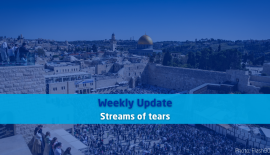Turmoil in and around Israel
The Israeli government has fallen. Today (30th June) the 24th Knesset (Parliament) in Israel was disbanded. The country is going again to elections, which will probably be held in October. The Prime Minister for the past year, Naftali Bennett, has stepped down as PM, and will be replaced by Yair Lapid until the elections.
In an emotional speech, Bennett announced that he is withdrawing from politics; he has handed over leadership of the Yamina party to Ayalet Shaked, and will not run in the next elections.
This was a most remarkable government. It comprised parties from across the political spectrum. Perhaps the most remarkable aspect was that the coalition government included the Ra’am Party (United Arab List), an Islamic/Arab party which is linked to the Muslim Brotherhood.
Many predicted the coalition would not last long. It was amazing it lasted a whole year.
Some have praised the government as a unique attempt to bring unity across the political spectrum, and for including an Arab party in the government. Others have criticized it as a dangerous experiment, unworkable and unable to make major decisions because of the diverging interests.
Former PM Benjamin Netanyahu, who has headed the opposition over the last year, has been a vicious critic of the government, which was formed on the platform of ousting Netanyahu.
The political culture in Israel has become more polarised over this period.
In the midst of this internal turmoil, Israel continues to face enormous external challenges. Analyst Dr. Jonathan Spyer warned this week that it is essential for the international community to realise that Israel is engaged in a difficult, hybrid war in the region against Iran. He explained that Israel has been undertaking many actions in the territory of the Iranian Islamic Republic, such as the recent killing of Colonel Sayad Khodai in Tehran, manifesting a significant shift in Israel’s strategy toward Iran. Israel realises increasingly it cannot rely on any other country in its war against the aggressive Iranian regime.
On a positive note, Unilever has decided to continue sales of Ben & Jerry’s ice cream in Israel and Judea and Samaria (the so-called “occupied territories”). It’s subsidiary Ben & Jerry’s had announced in July 2021 that it would end sales of its ice-cream in “occupied Palestinian territory.” This week’s announcement reverses that decision, and is a blow to the global BDS (boycott, divestment and sanctions) movement.
In these turbulent times, let us keep praying ever more fervently for unity in Israel, and for the Peace of Jerusalem. Above all, for the coming of the One who is King of kings and Lord of all – who will reign from Jerusalem.
The latest killings in Iran may indicate a notable shift in Israeli strategy
Dr. Jonathan Syper: “A change to the rules of engagement appears to have taken place, in which the totality of Iranian actions will now be opposed, including on Iranian soil.”
> Read more..
The soon-to-end coalition that nurtured two visions of Israel
Yossi Klein Halevi: “It has been a government of dual national reconciliation – between Jews and Arabs, between Jews and Jews. The alternative is the unraveling of Israeli cohesion.”
> Read more..
Negev Summit participants will meet regularly on regional security
Press release cites “the important opportunities unlocked by improved relations between Israel and its neighbors, showing what can be achieved by working together to overcome shared challenges.
> Read more..
Unilever reaches deal with Ben & Jerry’s Israel to end boycott
JNS reports: “The multinational consumer-goods company is selling its interest in Ben & Jerry’s Israel to the ice-cream maker’s Israel franchisee.”
> Read more..
Qal VaChomer – from lesser to bigger | Romans 9-11 with Johannes Gerloff #52
For Israel’s Messiah the conclusion that through their fall salvation has come to the non-Jews was utterly painful.
SCRIPTURE FOR THE WEEK: Zechariah 14:9
The Lord will be king over the whole earth. On that day there will be one Lord, and his name the only name.





